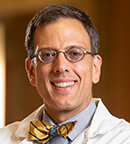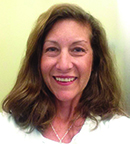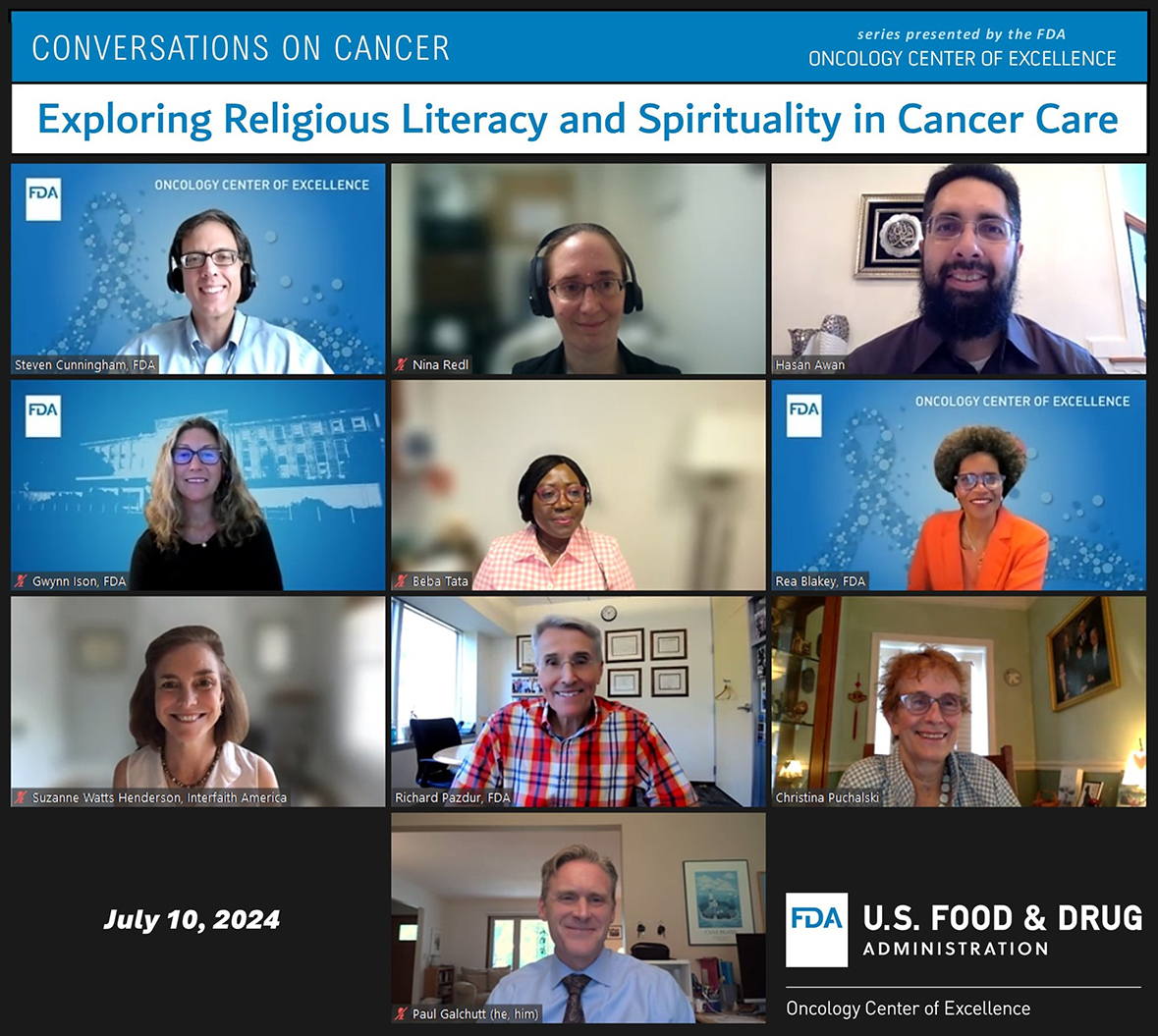
Steven Clark Cunningham, MD, MLA, FACS

Gwynn Ison, MD
OCE Insights is an occasional department developed for The ASCO Post by members of the Oncology Center of Excellence (OCE) at the U.S. Food and Drug Administration (FDA). In this installment, the OCE’s Steven Clark Cunningham, MD, MLA, FACS, Clinical Reviewer on the Gastrointestinal Cancers Team, Division of Oncology 3, and Gwynn Ison, MD, Clinical Reviewer on the Gynecologic/Breast Malignancies Team, Division of Oncology 1, review the recent panel discussion that took place on July 10 as part of the Conversations on Cancer series: Exploring Religious Literacy and Spirituality in Cancer Care.
What is the Conversations on Cancer series?
Conversations on Cancer is a public panel-discussion series that aims to examine cancer-related issues of social importance with panel members who are inclusive and diverse, both from within the FDA as well as without. Since its inception in 2017, the Conversations on Cancer have covered a wide diversity of topics, including discussions of cancer misinformation; cancer-care inequities; clinical trial and health-care access in marginalized communities; childhood drug development; oncology nursing; and many different disease-specific topics.
On July 10, 2024, OCE convened a Conversation on Cancer on Exploring Religious Literacy and Spirituality in Cancer Care. This event explored the complex and important relationship between cancer care and religion/spirituality.
Why is this an important topic?
The OCE dedicates substantial time and energy to the regulation of clinical trials for unmet oncology needs of patients with rare, serious, and life-threatening conditions. However, it is important to recognize that these patients—and indeed all patients—also have spiritual needs that are often unmet. Research indicates that most patients want their cancer care plan to incorporate their religious or spiritual beliefs.1
A Widely Accepted Definition of Spirituality
We humans are all spiritual insofar as spirituality is an intrinsic and dynamic part of our humanity through which we seek meaning and purpose and have relationships to self, to others, and to what we see as significant, sacred, or transcendent. Source: Puchalski CM et al.5Furthermore, as Christina Puchalski, MD, MS, pointed out, referencing her book Making Health Care Whole, spirituality is increasingly recognized to be an essential component of whole-person care and to be a determinant of health.2 Unfortunately, health-care providers frequently struggle to meet this need, citing a lack of time and a lack of training in religious literacy as main reasons.3,4
Religion and spirituality at the FDA?
It is important to clarify that this conversation is not about endorsing any specific religion, nor even endorsing religion over nonreligion. It is about recognizing the significant role religion and spirituality play in many people’s lives, especially when facing serious illnesses, such as cancer. Understanding religion and spirituality can help to provide better, more holistic care. In the words of OCE Director Richard Pazdur, MD: “This is an extremely important topic…. I think all of us have a personal interest in this.”
Who were the panelists?
This insightful interfaith panel included patients and providers, believers and nonbelievers, and religious and nonreligious discussants. It represented a remarkably wide variety of backgrounds, races, and worldviews.
Non-FDA Panelists
- Christina Puchalski, MD, MS, is the founder and Executive Director of the George Washington Institute for Spirituality & Health. A leader in spirituality and health, she has authored or edited many important contributions to the field, including Making Health Care Whole (2010) and the Oxford Textbook of Spirituality in Healthcare (2012).
- Suzanne Watts Henderson, PhD, is a religious-studies scholar who serves as Senior Director for Faith and Health at Interfaith America, an interfaith nonprofit organization. This past year, she spearheaded the 2023 Faith & Health Convening at the Chautauqua Institution in Washington, DC.
- Paul Galchutt, MDiv, MPH, BCC, is a health-care chaplain and Assistant Director of Engagement for Transforming Chaplaincy at Rush University. He also serves as a Sojourn Scholar at Cambia Health Foundation and is a PhD candidate at the University of Maryland.
- Nina Redl, MPhil, MPH, BCC, is a health-care chaplain who has worked in cancer care throughout her career. She currently serves as Manager of Spiritual Care at Penn Presbyterian Medical Center in Philadelphia.
- Beba Tata-Mbeng, MDiv, MPH, BCC, is a health-care chaplain also focusing on cancer care and now serving as Manager of Spiritual Care, Mayo Clinic Florida. Her program received a Demonstration Project grant from the George Washington Institute for Spirituality & Health (GWish) on incorporating spiritual care through a spiritual-generalist model.
- Hasan Awan, MD, is a medical internist working in the Baltimore area, where he also lectures on integrating spirituality into primary care. He is an expert in Islamic spirituality and is the author of Islam of the Heart: Living Religion with Presence (forthcoming).
FDA Panelists
- SCC organized and moderated the panel discussion. He also has a master’s degree in the cultural-studies approach to religion (focusing on religious literacy in health care) and is the author of It’s Considerate to Be Literate about Religion (2022), a book about religious literacy for teens and adults.
- GI co-moderated the panel discussion, also sharing her perspective as a cancer survivor.
- Richard Pazdur, MD, is Director of the OCE.
- Rea Blakey is Associate Director for External Outreach and Engagement at the OCE.

A screenshot of all panelists from the July 10, 2024, Conversations on Cancer series: Exploring Religious Literacy and Spirituality in Cancer Care. See the text for their full titles and affiliations.
What is religious literacy?
One point of departure for the panelists was discussing the difference between religion and spirituality. The conversation highlighted that although not all people are religious, a great many consider themselves to be spiritual. In fact, according to the most widely accepted definition of spirituality, we humans—though not all religious—are all spiritual insofar as spirituality is an intrinsic and dynamic part of our humanity through which we seek meaning and purpose and have relationships to self, to others, and to what we see as significant, sacred, or transcendent.5
With this in mind, the panel made several references to two important milestones. The first is the 2022 JAMA article on spiritual care in serious illness and health,6 one that the panelists considered a truly landmark article at the intersection of health and spirituality. The second centers on the American Academy of Religion’s guidelines on what constitutes religious literacy as the foundation upon which that spiritual care rests, as summarized here:
- To discern credible knowledge about religious expressions by, for example, understanding that religions are not actors with agency. In other words, people—and not religions—do things in the world, often while employing religious expressions.
- To recognize the internal diversity within religious traditions.
- To appreciate how religion is deeply embedded in public life and has shaped (and is shaped) by the experiences and histories of individuals, communities, and nations.
- To understand that all knowledge is situated and comes from a particular perspective, including (and perhaps especially) knowledge about religious expressions that employ cultural symbols of their times and contexts.
- To distinguish confessional or prescriptive statements made within religions from descriptive or analytical statements about religion(s).
What are some take-home messages?
Discussion focused on the experience of the panelists (as both patients and providers) with spirituality during cancer care and on how the religious literacy and spirituality of both the patients and their providers may affect this care. Of particular interest was how the provision of good spiritual care rests on a foundation of religious literacy and how increasing religious literacy and spiritual care may increase rapport and foster good communication between providers and patients—especially underserved patients.
What Is AMA Resolution 304?
Resolution 304 (A-24) from the American Medical Association (AMA) House of Delegates centers around enhancing awareness about whole-person care through spirituality in medical education and practice. In July 2024, at the Oncology Center of Excellence’s Conversation on Cancer on Exploring Religious Literacy and Spirituality in Cancer Care, Christina Puchalski, MD, FACP, Executive Director of GWish, announced that the decades of work by so many in this area recently culminated in the passage of AMA Resolution 304 (A-24), which, in the preliminary report of actions taken by the House of Delegates, was recommended for adoption at its 2024 Annual Meeting. Accordingly, Dr. Puchalski went on to explain, GWish has developed an interprofessional spiritual care training program for all clinicians and chaplains on how to integrate spiritual health in their clinical settings.
Highlighting the emerging realization that spiritual care is an essential part of whole-person care (bio-psycho-social-spiritual care), the panel stressed the importance of screening for spiritual distress in all patients but especially those with cancer. Regarding what has become increasingly known as the generalist-specialist model of spiritual care, several panelists discussed both the need for all clinicians to be spiritual generalists who attend to patients’ spiritual health and the benefit of working together with chaplains and other spiritual specialists in a team approach.
The panel also discussed how providing spiritual care benefits not only patients, but also the burnout-prone providers in today’s health-care arena. This panel clearly had a deep and first-hand understanding about the power of spiritual care to enhance cancer care and support the well-being of both patients and health-care providers.
One highlight of the discussion was when Dr. Puchalski made the announcement about the passage of AMA Resolution 304: Spirituality in Medical Education and Practice (see Sidebar). “I’m happy to be finally allowed to say that they passed [the] resolution in June…. You are the first to know here!”
In conclusion, there was broad agreement that, although much work remains, much progress has been made toward truly whole-person cancer care (and all medical and surgical care) that includes the oft-neglected spiritual care. For on-demand viewing of this Conversation in Cancer, visit https://youtube.com/live/8uPEzsOKwog.
Where can I get more information about religious literacy and spirituality?
Several resources for patients and providers were mentioned and are listed here:
- The George Washington University’s Institute for Spirituality and Health (GWish; https://gwish.smhs.gwu.edu)
- The Center for Spirituality, Theology, and Health at Duke University (https://spiritualityandhealth.duke.edu)
- Harvard University’s Religion and Public Life program (https://rpl.hds.harvard.edu/what-we-do/our-approach/what-religious-literacy)
- Interfaith America (https://www.interfaithamerica.org)
- The 2022 book that describes and illustrates religious literacy, It’s Considerate to Be Literate about Religion (https://www.orangehatpublishing.com/product-page/it-s-considerate-to-be-literate-about-religion-paperback)
- The 2010 book Making Health Care Whole: Integrating Spirituality into Patient Care (https://archive.org/details/makinghealthcare0000puch)
- The 2022 JAMA article “Spirituality in Serious Illness and Health” (https://jamanetwork.com/journals/jama/fullarticle/2794049).
DISCLOSURE: Dr. Cunningham and Dr. Ison reported no conflicts of interest.
REFERENCES
1. Kelly EP, Paredes AZ, DiFilippo S, et al: Do religious/spiritual preferences and needs of cancer patients vary based on clinical- and treatment-level factors? Ann Surg Oncol 28:59066, 2021.
2. Long KNG, Symons X, VanderWeele TJ, et al: Spirituality as a determinant of health: Emerging policies, practices, and systems. Health Aff (Millwood) 43:783-790, 2024.
3. Chan WAY, Sitek J: Religious literacy in healthcare. Religion & Education 48:102-120, 2021.
4. Balboni MJ, Sullivan A, Enzinger AC, et al: Nurse and physician barriers to spiritual care provision at the end of life. J Pain Symptom Manage 48:400-410, 2014.
5. Puchalski CM, Vitillo R, Hull SK, et al: Improving the spiritual dimension of whole person care: Reaching national and international consensus. J Palliat Med 17:642-656, 2014.
6. Balboni TA, VanderWeele TJ, Doan-Soares SD, et al: Spirituality in serious illness and health. JAMA 328:184-197, 2022.

